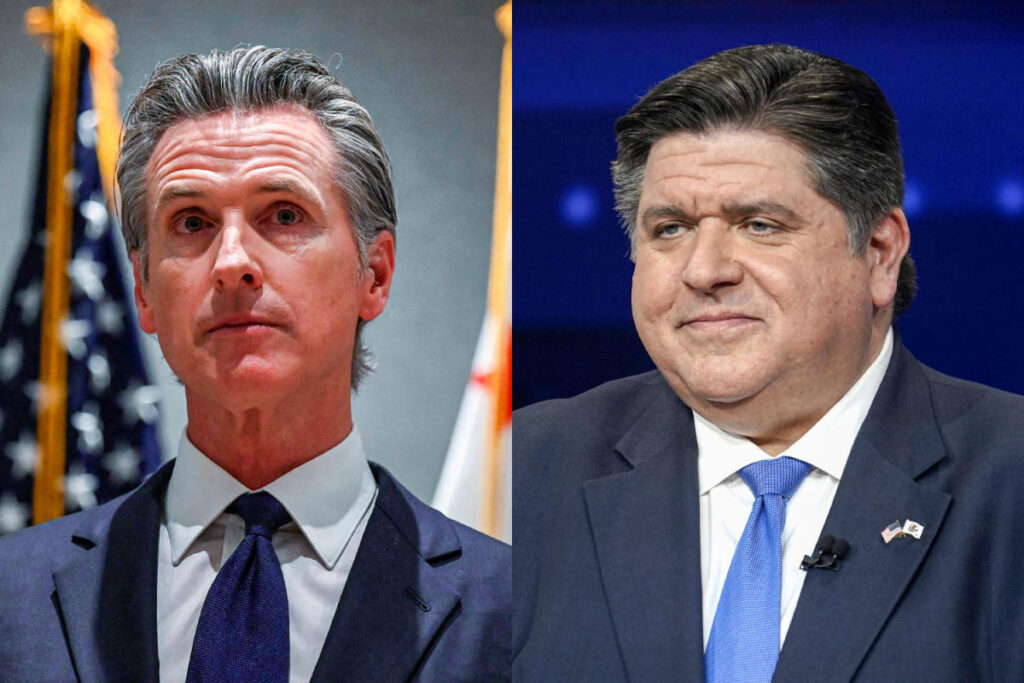As the 2024 U.S. presidential election approaches, a coalition of Democratic governors in blue states is gearing up to counteract potential federal actions under Donald Trump’s new administration. This plan mirrors their prior strategies during Trump’s initial term, emphasizing a robust commitment to preserving the progressive policies and values characteristic of their states. These governors, among whom several eye a 2028 presidential bid, express a united front, signaling readiness to legally and politically defend against federal overreach, especially in areas like civil rights, reproductive freedom, climate change, and immigration.
California’s Governor, Gavin Newsom, is at the forefront, having announced plans for a special legislative session aimed at “safeguarding California values.” He intends to bolster legal resources to protect specific rights across vulnerable groups. Newsom’s administration plans to take swift measures to counter any potential threats to LGBTQ rights, women’s rights, and immigrant protections, emphasizing the necessity of legal and financial support to combat federal actions perceived as unjust. His administration portrays this initiative as the first in a series of proactive steps to ensure the state’s interests remain unharmed in the face of impending federal policies.
In Illinois, Governor JB Pritzker articulated similar sentiments, positioning the state as a protective haven for residents facing infringements on their rights from federal governance. He highlighted ongoing measures aimed at shielding abortion rights and ensuring access to gender-affirming care. Pritzker revealed that the state is contemplating further legal protections for individuals traveling to Illinois for medical services that may be restricted elsewhere. By collaborating with other Midwestern states, Pritzker’s administration seeks to share best practices learned during previous challenges under Trump’s governance.
New York’s Governor Kathy Hochul has also initiated an “Empire State Freedom Initiative,” which will tackle anticipated federal threats concerning civil liberties, reproductive rights, and environmental protections. Hochul affirmed her commitment to fortifying New Yorkers’ freedoms while preparing a legislative framework that anticipates regulatory impacts from Trump’s administration. The initiative signifies proactive government efforts to address potential alterations to established state policies, demonstrating a collaborative approach with the state’s Democratic Attorney General, Letitia James.
Massachusetts Governor Maura Healey pledged to leverage all available avenues, including executive and regulatory authority, to uphold the rule of law and protect residents from Trump’s anticipated immigration policies, notably against mass deportations. Healey, who previously challenged Trump’s directives on several occasions, indicated her resolve to resist the administration’s legislative incursions, implying that state-level repudiation of federal actions is a paramount goal among her administration’s objectives amid concerns about democratic values.
Conversely, Pennsylvania’s Governor Josh Shapiro emphasized unity and bipartisan cooperation in the wake of Trump’s reelection. Despite his commitment to defending resident freedoms, Shapiro acknowledged the complexities presented by a divided state legislature, which poses a more significant hurdle to counter-Trump initiatives compared to his deeply Democratic counterparts in other states. He remains firm in his stance to uphold the freedoms and rights of Pennsylvanians, signifying an emphasis on productive governance even amid political disagreements.
New Jersey Governor Phil Murphy pledged to resist any Trump administration policies that contradict state values, particularly in immigration and reproductive rights arenas, while also expressing willingness to engage in constructive dialogue on common ground issues. His dual approach underscores the multifaceted strategies employed by Democratic governors, balancing defense against rights infringements with openness to cooperation when feasible, reflecting the complex landscape of American governance where local state interests must contend with federal authority. The governors’ proactive measures reveal an organized and strategic resistance to the anticipated push from the Trump administration structured around safeguarding their states’ progressive fabric.

